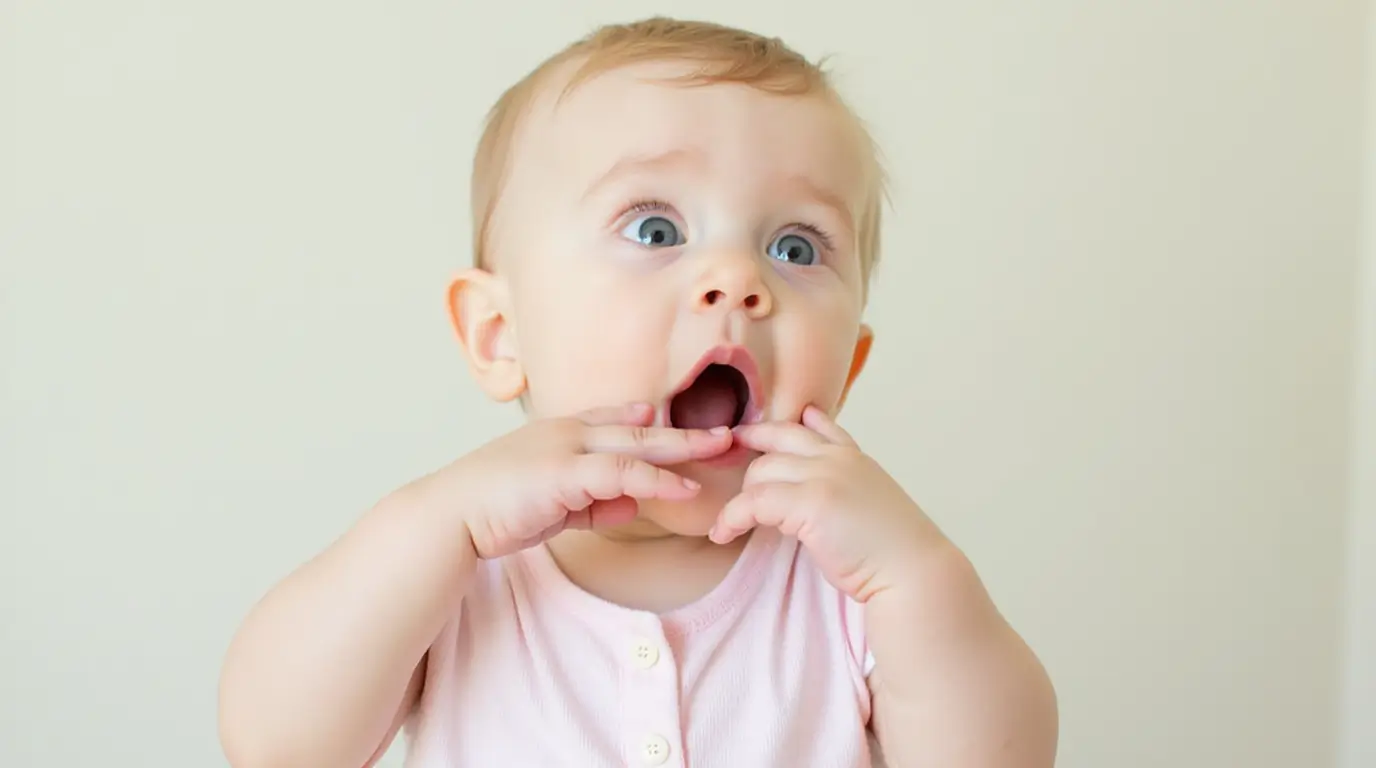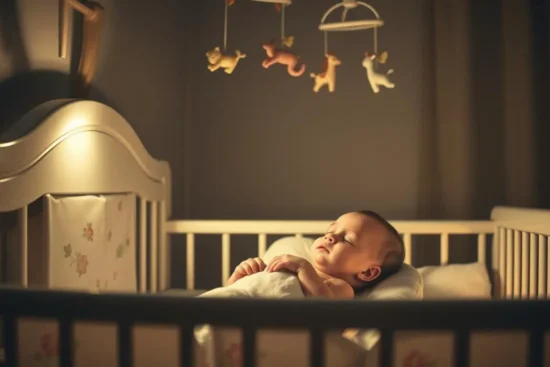
When Should Babies Start Talking? As parents, it’s natural to wonder when our little ones will start talking. Knowing about infant language skills and speech milestones is key. It helps us spot any issues early.
Watching our babies’ language development is very important. It shows how well they’re doing in thinking and social skills. By knowing when they should hit certain speech marks, we can help them more and tackle any worries.
Key Takeaways
- Understanding typical speech milestones is key to spotting issues.
- Infant language skills grow fast in the first year.
- Baby speech milestones include cooing, babbling, and first words.
- Keeping an eye on language growth supports thinking and social skills.
- Knowing when speech milestones should happen helps tackle worries.
👶 Must-Have Baby Products Every Parent Needs – Shop Top Picks on Amazon
From newborn essentials to toddler favorites, the right baby products can make parenting smoother, safer, and even more joyful. Whether you’re shopping for your own little one or picking the perfect baby shower gift, we’ve got you covered!
🍼 Diapers, wipes, bottles & feeding gear
🛏️ Cribs, bassinets, baby monitors & nursery must-haves
🧴 Lotions, shampoos & sensitive-skin baby care
🎁 Gift sets, toys & accessories
👉 Browse the best baby products on Amazon
✔️ Trusted brands like Pampers, Enfamil, Aveeno Baby, and Graco
✔️ Parent-approved with thousands of 5-star reviews
✔️ Fast delivery & easy returns
Everything you need for baby’s first year — all in one place. 💗
Understanding Baby Communication Development
Baby communication development is truly fascinating. It sets the stage for their future language skills. Early communication is key to a child’s growth.
The Importance of Early Communication
Early communication is essential. It lets babies share their needs and bond with caregivers. Effective communication from the start builds a strong relationship. It also helps with emotional and social growth.
It also prepares the way for learning more language as they get older.
How Babies Learn Language
Babies start learning language by listening and imitating sounds. They begin with cooing and babbling. Then, they move to more complex sounds and words.
Parental interaction is very important. Talking to babies and responding to their attempts to communicate helps a lot. A language-rich environment can greatly improve a baby’s language skills.
When Should Babies Start Talking?
Watching a baby’s first words is a big moment for parents. Babies start to talk in different ways as they grow. Knowing when they should say their first words helps parents see if they’re on track.
Normal Speech Development Timeline
Babies start making sounds from the beginning. They coo and gurgle. By 6 months, they begin to babble and make consonant sounds.
By 12 months, they say their first words. By 18 months, they start putting words together to form simple sentences.

The normal speech development timeline helps parents see how their baby is doing. But, every baby is different. Some might talk sooner, others later.
Individual Differences in Development
Every baby grows at their own speed. Things like genetics and how much they hear can affect when they start talking. Some might say their first words early, others later.
If you’re worried about your baby’s talking, talk to a doctor. Knowing the range of normal development is key. But, if there’s a big delay, getting help early is important.
The First Speech Milestones: 0-6 Months
The first six months are key for your baby’s language skills. During this time, they make big steps in talking.
Cooing and Gurgling
One of the first signs is cooing and gurgling. This stage is filled with vowel sounds and sometimes consonant-like sounds. Babies start cooing around 2 months, showing they’re trying to make sounds.
Cooing and gurgling are important. They help prepare for future language skills.
Recognizing Voices and Sounds
Another important milestone is recognizing voices and sounds. Babies as young as a few months can tell different voices and sounds apart. They might turn their head to a familiar voice or react to loud noises.
This skill is a big step in their language development. It shows they’re starting to link sounds with communication.

Supporting Communication at This Stage
To help your baby’s communication, do activities that boost language skills. Here are some ways:
- Talk to your baby often, describe what you’re doing, and point out objects and animals.
- Respond to their coos and gurgles, encouraging more sounds.
- Read books with simple, colorful pictures and fun textures.
By doing these things, you can support your baby’s language growth. This will help them build a strong foundation for talking in the future.
Building Communication: 6-12 Months
The time from 6 to 12 months is key for babies. They start to get better at talking and understanding the world. They learn simple words and gestures.
Babbling and Consonant Sounds
Babies start babbling around 6 months. They make sounds like “ba,” “da,” or “ma.” This is the first step towards speaking.
As they get better, they mix consonant and vowel sounds. This is how they start to form their first words.
Understanding Simple Words
By 9 months, babies start to get simple words. They might not talk yet, but they understand “no” or their names. This is a big step towards their first words.
Parents can help by talking to their babies. Using real names for objects is also helpful.
Activities to Encourage Language Development
Parents can do many things to help their babies talk better. Reading books with simple pictures and talking during daily routines helps a lot.
| Activity | Age | Benefit |
|---|---|---|
| Reading | 6-12 months | Enhances vocabulary |
| Babbling conversations | 6-9 months | Encourages sound experimentation |
| Responding to gestures | 9-12 months | Develops understanding of simple commands |
First Words and Beyond: 12-24 Months
Between 12 and 24 months, babies go through a lot of language growth. They start saying their first words and making simple sentences. It’s a very exciting time.
Milestone 5: First Words
By their first birthday, many babies say their first words. These words are simple and might not be full sentences. But they are the start of talking.
Common first words are “mama,” “dada,” and names of people or things they know. As they get closer to 18 months, they learn more words. They start to understand what these words mean.
Milestone 6: Word Combinations and Simple Sentences
By 18 to 24 months, kids start putting two words together. This is a big step in learning language. It shows they understand how sentences work.
For example, a child might say “mama go” to mean their mom is leaving. This shows they’re getting better at using words together.
Language-Rich Environments for Toddlers
It’s very important to make a language-rich space for toddlers. Talking to them, reading books, and answering their attempts to talk helps a lot. This boosts their language skills.
Dr. Hart and Dr. Risley say, “The single most important factor influencing language development is the amount of talk in the child’s environment” (
The Meaning of Language by Dr. Betty Hart and Dr. Todd Risley
). This shows how important talking is for a child’s language growth.
| Activity | Benefit |
|---|---|
| Reading Together | Expands vocabulary and encourages a love for books |
| Conversing Regularly | Improves understanding of language structures and syntax |
| Responding to Babbling | Encourages further communication attempts |
When to Be Concerned About Speech Delays
Every child grows at their own pace. Yet, some signs may point to a speech delay. Knowing these signs can help spot issues early. Understanding infant language skills is key.
Red Flags at Different Ages
Keep an eye on your child’s speech milestones. Here are red flags for different ages:
- By 6 months: No cooing or making vowel sounds.
- By 9 months: No babbling or making consonant sounds.
- By 12 months: No gesturing (pointing, waving, etc.) or saying any words.
- By 18 months: No single words or not combining two words together.
- By 24 months: Not saying around 50 words or not putting two words together.
Watching these milestones can help spot issues early.
When and How to Seek Professional Help
If you see any red flags, get professional help. Start with your pediatrician. They can check your child’s development and refer you to specialists if needed. Early intervention is key to tackle speech delays. Speech-language pathologists (SLPs) can help with toddler speech tips and strategies.
If you worry about your child’s speech, don’t wait. With the right support, many kids can improve their language skills.
Conclusion
It’s important to know about the different stages of baby talking. This helps your child grow their language skills. From the first sounds to saying their first words, each step is a big deal.
Baby communication changes a lot from 0-24 months. Knowing these changes and watching for any signs of trouble can help spot speech delays early.
Creating a world full of words and engaging in activities that boost language skills is key. This helps your child talk better. It also makes your bond stronger.
Remember, every baby grows at their own speed. Keeping up with their progress and getting help when needed is very important. It can really help your child’s language skills grow.
FAQ
When should babies start talking?
Babies start making sounds like cooing and babbling around 0-6 months. They say their first words around 12 months. By 12-24 months, they start combining words into simple sentences.
What are the normal speech development milestones for babies?
Normal milestones include cooing and gurgling (0-6 months). They start babbling and making sounds around 6-12 months. Saying first words happens around 12 months. They form simple sentences between 12-24 months.
How can we support our baby’s communication development?
We can support our baby by responding to their sounds. Engage in conversations and read books together. Create a language-rich environment.
What are some red flags for speech delays in babies?
Red flags include not cooing or making sounds by 6 months. Not babbling by 9 months. Not saying words by 12 months. Not combining two words by 24 months.
When should we seek professional help for our child’s speech development?
Seek help if you notice any red flags or have concerns. Early intervention is key to address any issues.
How can we encourage language development in our toddler?
Encourage language by reading, singing, and talking. Create a language-rich environment to foster their skills.
What is the importance of early communication in babies?
Early communication is vital for a baby’s development. It sets the stage for future language skills and social and emotional growth.
How do babies learn language?
Babies learn by listening and making sounds. They interact with caregivers who respond to their attempts to communicate.







